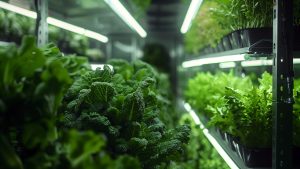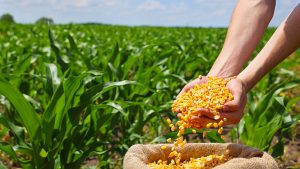Dr. Adam M Adamek, Director of Innovation at EIT Food, explores the role that Agrifood Innovation can play in fostering protein diversification and transformation into a more equitable and more resilient food system.
Our food system is at a critical time. Climate change, resource shortages and geopolitical shocks put unprecedented pressure on food security around the world. With COP30 on the horizon, the global spotlight is once again moving towards climate action. The food system must be front and center.
The food sector, which is responsible for one-third of the world’s greenhouse gas emissions, is under increasing pressure to reduce its environmental footprint.
One of the most promising pathways is protein diversification. This involves including plant-based, cultivated, fermented, and insect-based proteins in addition to traditional animal sources. As food demand grows and planetary boundaries are tested, diversification of protein supply offers a unique opportunity to align food system transformations with climate targets. Europe can not only reduce emissions by investing in innovative and sustainable protein sources, but also strengthen food security and resilience globally.
Rethinking the benefits of protein
The benefits of moving towards more diverse protein sources can be enormous across climate, health and resilience, but are often not widely known.
One of the most important benefits of protein diversification is increased land use efficiency. While traditional animal agriculture is highly land-intensive, recent studies have shown that a 50% shift from animal-based to plant-based or cultivated proteins can free up to 47.3 million acres of land. Highly likely ecological recovery and carbon capture. Technology, its impact can be profound.
Protein diversification plays an important role in reducing emissions. “Alternative” or “various” proteins produce significantly fewer greenhouse gases compared to traditional livestock agriculture, providing a clear pathway to reducing the climate impact of food systems. Recent research has found that when diversified proteins rise to half of the global protein market, agriculture and land use greenhouse gas emissions will fall by 31% by 2050.
Beyond the benefits of the environment, diversifying protein sources can also support the transition to a healthier diet. Many diverse proteins, such as plant-based proteins, cultivated meat and insect proteins, offer low levels of saturated fat and improved nutritional profiles without antibiotics or hormones. As part of a balanced diet, they can help reduce the risk of chronic diseases such as heart disease and obesity.
Ultimately, by adopting a broader protein source, we can build food systems that are not only more sustainable, but more resilient, efficient, and tailor to public health goals.
Innovations in protein diversification: Reconstructing the current situation
European startups play a key role in driving innovation in this sector. Currently, 47 of the 174 companies involved in cultivated meat are Europeans, and 61 of the 158 companies involved in biomass-based and precise fermentation have also been based in Europe.
EIT Food supports these startups at the forefront of the protein revolution through the EIT Food Accelerator Network. Through the network, EIT Food provides early stage innovators with funding, mentorship and access to the market. An exciting example is a startup that pioneers the use of Fungal fermentation to convert sidestreams in the food industry into high protein sustainable ingredients. Nomy offers a scalable, cost-effective solution that supports cyclicity and reduces dependence on traditional protein sources.
Revo Foods is another standout example through the work of leveraging 3D food prints to produce 100% plant-based seafood. With customized support from the EIT Food Accelerator Network and the opportunity to leverage a vibrant and innovative community of food sector entrepreneurs, Revo Foods has quickly tracked partnerships with restaurants and supermarkets, allowing diversified proteins to be utilized in everyday life.
Overcoming barriers to scale
Despite the rapid growth of protein diversifying sectors, major challenges remain. Most notably, regulations and consumer acceptance. Regulatory frameworks are creating uncertainty for companies that are struggling to cope with innovation and are seeking to bring new protein products to the market. At the same time, consumer perceptions of taste, safety and familiarity continue to influence purchase decisions and slow adoption.

However, the industry’s momentum is beginning to change consumer habits. Recent reports show that increasing availability of diverse protein products in Germany and the Netherlands has encouraged an increase in consumer demand for these products, indicating a self-enhancing relationship between supply and demand. In 2023 alone, global retail sales of plant-based alternatives skyrocketed 34%, contributing to 26.3 billion euros from the previous year. This indicates that protein diversification is no longer a niche trend.
EIT Food’s Consumer Observatory provides important insights into these behavioral dynamics. By tracking attitudes across Europe, consumer stations identify gaps between consumer trust and understanding, allowing targeted strategies to improve awareness, transparency and engagement. Addressing these barriers is essential to maximize the potential for protein diversification and ensuring integration into a sustainable diet of scale.
Looking at the policy environment, food system transformations are often degraded in climate strategies. This is because it is difficult to quantify the impact on agriculture, and food habits and agricultural practices are deeply embedded in cultural contexts. Knowledge transfer between system actors is key to success. That’s why EIT Food is working with farmers and key producers through transition-centric projects and knowledge transfer initiatives.
The EIT Food Regenerative Agriculture Project is helping to support sustainable agriculture, improve the resilience of the local economy, and ensure that no one is left behind in the Agrifood transition. Accepting diverse protein sources allows farmers to explore more commercial and environmental land use and have a positive impact on value chain profitability and negotiation position.
However, maintaining coordinated behavior can be challenging as responsibility is fragmented across communities and government sectors. Innovative startups with freedom of experimentation and exploration can create a diverse market that can help overcome these challenges and help pave the way.
Looking for COP30: Accelerating transitions
As global leaders prepare for the COP30, these innovations will not only provide environmental solutions, but also a powerful lever to inform food and climate policies. By rethinking what proteins are capable of and reshaping the status quo, innovation can encourage new frameworks for regulation and policy, leading to a more sustainable future.
There is an important opportunity to position protein diversification as a key component of global climate strategies. As countries are looking for solutions to mitigate climate change, diverse proteins provide a direct pathway to reduce emissions from food systems.
COP30 negotiators are encouraged to consider including support for alternative proteins as a formal part of their climate mitigation strategy, reflecting FAO’s 2023 recommendations from food security and nutritional status.

To accelerate this transition, global leaders should target interdisciplinary collaboration, investments in innovation, and prioritize robust regulatory support to drive startup change. These actions are essential to maximize protein diversification potential and accelerate the transition to resilient, low-carbon food systems around the world.
About EIT Food
EIT Food is the world’s largest and most dynamic food innovation community. Accelerate innovation and create a future-compatible food system that produces healthy and sustainable foods for all.
Supported by the European Union’s institution, the European Union’s Institute for Innovation and Technology (EIT), it invests in projects, organizations and individuals who share the goals of healthy and sustainable food systems. Unlock the possibilities of corporate and university innovation, create and expand Agrifood startups, bringing new technologies and products to the market. We build trust by reconnecting entrepreneurs and professionals with the skills needed to transform the food system and put consumers at the heart of their work, and reconnecting them to their food origins.
We are one of nine innovation communities founded by the European Institute for Innovation and Technology (EIT) and an independent EU institution established in 2008 to promote innovation and entrepreneurship across Europe.
reference
“The food system accounts for more than one-third of the world’s greenhouse gas emissions,” the UN’s Food Agriculture Organization, and the food system accounts for more than one-third of global greenhouse gas emissions. – EIT Food Kozicka, M, Havlík, P, Valin, H et al. New plant-based meat and milk alternatives are used to give climate and biodiversity goals. Nat Commun 14, 5316 (2023). https://doi.org/10.1038/S41467-023-40899-2 Healthy Eating Fact Sheet, World Health Organization, Healthy Eating, Towards a Resilience and a Sustainable Future: EU Agri-Food Sector 2024 ‘Paper, Eit Food Coptifification Tank – Eit Food, Eit Food Coptifification Tark, eitfood.eu/files/pd-narrative-paper-10.11.pdf “European supermarkets compete to lead the global protein transition,” Madre Brava, Madre Brava – European supermarket competition 2023 Industrial Report/Plant-based Meat, Seafood, Eggs, and GFI Europe, Industrial Report Europe, dairy
This article will also be featured in the 23rd edition of Quarterly Publication.
Source link

